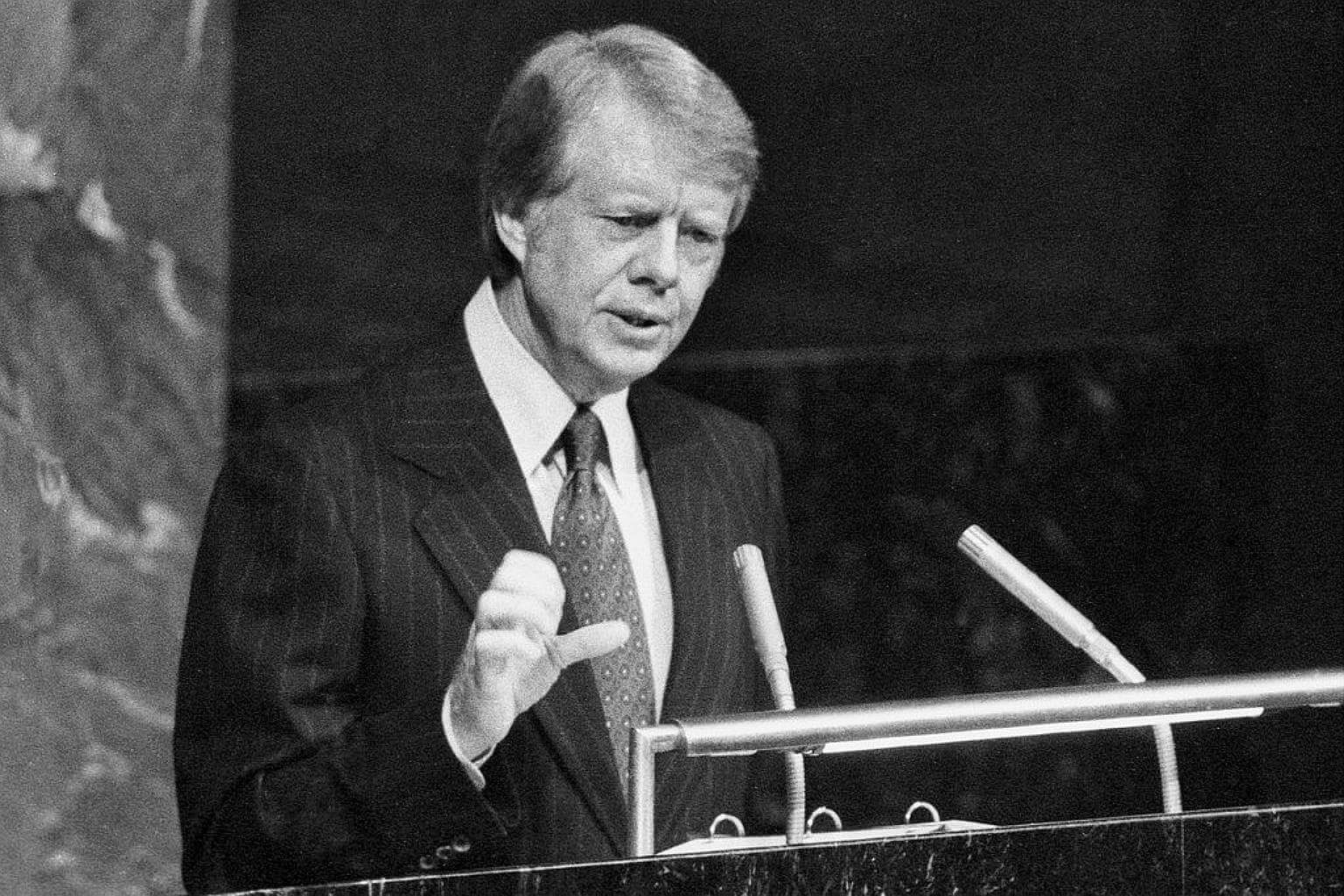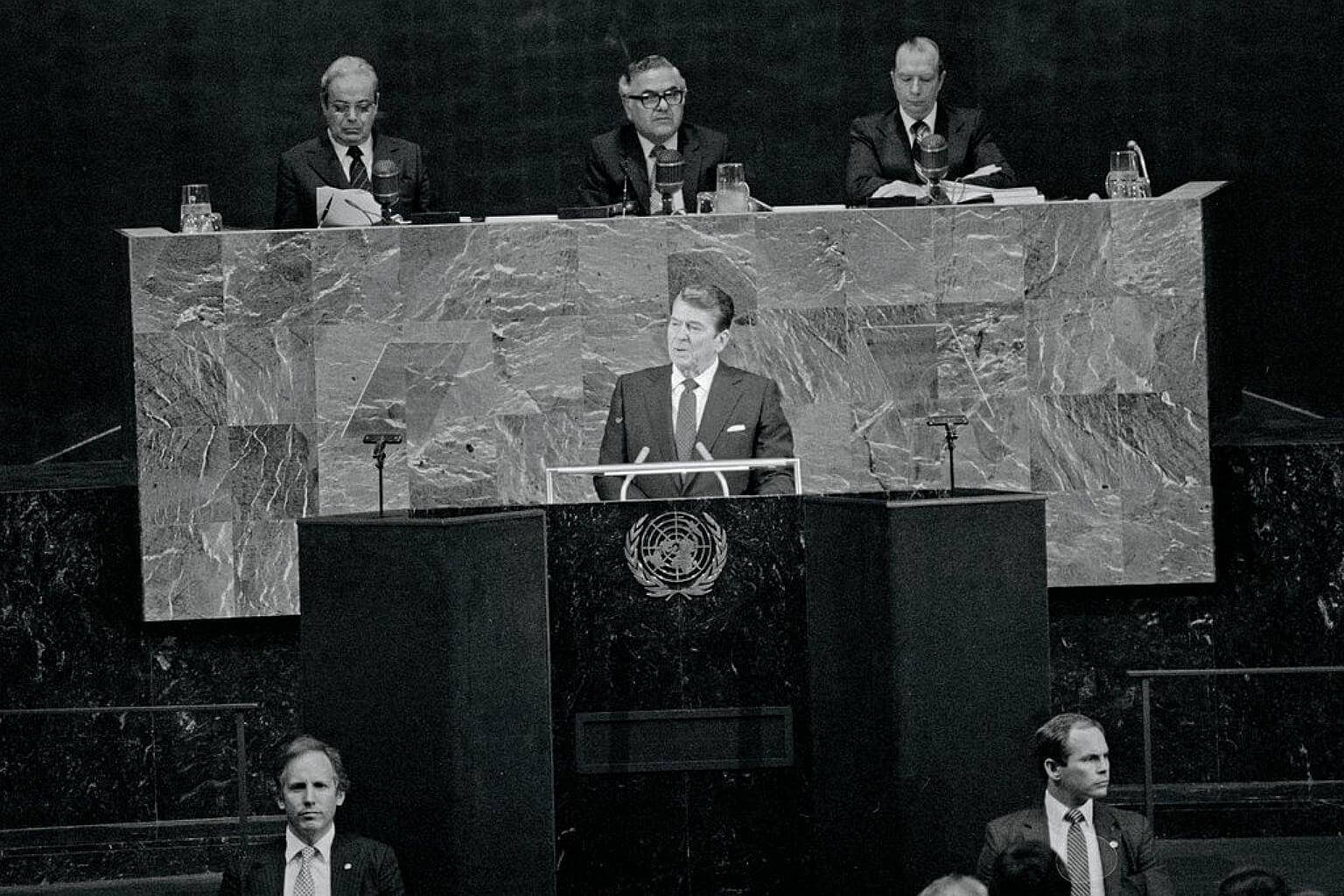NEW YORK (NYTIMES) - In 1946, US President Harry Truman welcomed the first session of the United Nations General Assembly to New York.
After remarking on the pride that the United States felt in hosting the international body, his speech quickly shifted into a display of American strength in the wake of World War II.
That mix of high-flown diplomatic ideals and the force of American influence has long characterised presidential addresses to the body.
In President Donald Trump's first address to the delegates on Tuesday (Sept 19), he castigated North Korea and Iran and emphasised an "America First" agenda.
"If the righteous many don't confront the wicked few, then evil will triumph," he said.
Here's a look at how other presidents used their addresses to frame the United States' view of the world:
Nixon: "The Time Has Come for Peace"

President Richard Nixon's inaugural address to the United Nations, in the fall of 1969, came as the United States had become a target of criticism abroad for its actions in Vietnam.
The newly elected president, who had said during his campaign that he would bring an "honorable end" to the war, acknowledged those concerns directly.
"The people of Vietnam, North and South, have endured an unspeakable weight of suffering for a generation, and they deserve a better fate," he said.
But he also displayed his reluctance to end the war without concessions from North Vietnam.
As The New York Times wrote, the address reflected the White House's feeling that the many diplomats who had asked that the United States back off its aggression "have a moral obligation now to press the North Vietnamese for more serious negotiations."
The speech received a "cool reception," The Times reported. The war would go on for nearly six more years.
Ford: "The Economy of the World Is Under Unprecedented Stress"

With much of the West facing an economic crisis - brought on, in part, by a union of oil-producing Arab nations - President Gerald Ford used his first UN address, in 1974, to underscore the degree to which the world economy had become interdependent.
"Let us not delude ourselves," he said. "Failure to cooperate on oil and food and inflation could spell disaster for every nation represented in this room."
But the president also used his speech to project American strength, scolding the Arab nations and using an ad-libbed portion of his remarks to compliment his secretary of state, Henry Kissinger.
"Some Arab delegates said they sensed a new 'tough line' in President Ford's remarks," The Times reported.
Carter: "We Can Only Improve This World If We Are Realistic About Its Complexities"

President Jimmy Carter, perhaps the American leader most visibly dedicated to international human rights, visited the United Nations earlier than most presidents, and he first addressed the General Assembly at an unofficial meeting in March 1977.
"I have come here to express my own support, and the continuing support of my country, for the ideals of the United Nations," he said.
In his speech, he asked that the United Nations "strengthen" its focus on human rights and, in an unusual rhetorical gesture, placed American strength in the service of the world.
"The United States, my own country, has a reservoir of strength: economic force, which we are willing to share; military strength, which we hope never to use again; and the strength of ideals, which are determined fully to maintain the backbone of our own foreign policy."
Reagan: "The Scourge of Tyranny Cannot Be Stopped With Words Alone"

President Ronald Reagan first addressed the General Assembly unusually late: in June 1982 before a special session on disarmament.
He used the address to excoriate the Soviet Union, saying that the superpower had built up its military forces and had violated international arms agreements.
He said he yearned to follow the directions of Pope Paul VI, who had asked the members of the United Nations to lay down their arms.
"But we need more than mere words, more than empty promises before we can proceed," the president said.
"Some in the chamber said later that they disapproved of Mr. Reagan's harsh anti-Soviet tone," The Times reported.
But Menachem Begin, Israel's prime minister, as well as many European representatives, "applauded the president vigorously."
Bush: "Rid the World of These Truly Terrible Weapons"

More than seven years after Reagan's first speech, President George Bush found himself on the defensive on the matter of disarmament in September 1989.
In December 1988, President Mikhail Gorbachev of the Soviet Union had appeared before the United Nations pledging drastic cuts to his country's armed forces.
Maureen Dowd, covering the address for The Times, reported that Bush's advisers had hoped for his speech to "match and perhaps outshine" Gorbachev's.
Bush promised his own cuts to weapons programmes, pledging, with certain conditions, that the United States would destroy more than 98 per cent of its chemical weapons stockpile within the next eight years.
But apparently, his speech could not measure up: A section of Dowd's article was labeled, "Doesn't Outshine Gorbachev."
Clinton: "We Live at a Turning Point in Human History"

With the Soviet Union no longer a concern, President Bill Clinton's first address to the United Nations was optimistic as he reveled in the birth of "dozens of new democracies."
"The superpower standoff that for so long stymied the United Nations'work almost from its first day has now yielded to a new promise of practical cooperation," he said.
But he recognised that the economic and technological forces of globalisation, as well as resurgent ethnic and religious forces, stood as threats.
He asserted the United States' control over the United Nations, asking that its peacekeeping forces more clearly define their mission, and cautioned that American support for intervention in countries like Bosnia would not always be a guarantee.
"The United Nations simply cannot become engaged in every one of the world's conflicts," he said. "If the American people are to say yes to UN peacekeeping, the United Nations must know when to say no."
George W Bush: "Civilization Itself, the Civilization We Share, Is Threatened"

Just two months after the terrorist attacks of Sept. 11, 2001, President George W Bush's first speech to the General Assembly was as stark as his predecessor's was hopeful.
He encouraged the nations of the world to join the United States in its fight against terrorism and warned that no country was safe from such attacks "A few miles from here, many thousands still lie in a tomb of rubble," he said.
He added later: "Every nation has a stake in this cause. As we meet, the terrorists are planning more murder - perhaps in my country, or perhaps in yours."
Obama: "We Share a Common Future"

President Barack Obama sought to use his first address to the UN General Assembly, in September 2009, to distinguish himself from his predecessor, acknowledging global distrust of the United States and pledging a new multilateralism.
He emphasised his promises to end the use of torture and to close the prison at Guantánamo Bay.
He also said that the United States was committed to "responsibly ending" the war in Iraq.
"Those who used to chastise America for acting alone in the world cannot now stand by and wait for America to solve the world's problems alone," he said. "We have sought - in word and deed - a new era of engagement with the world."
Of course, Obama was unable to make good on several of those pledges, even as he used the meeting to make progress on foreign policy objectives regarding Iran and nuclear disarmament.
As The Times noted in its coverage, "While much of his language was different and more conciliatory, the backbone of American policy on some issues remained similar to the Bush administration's."

